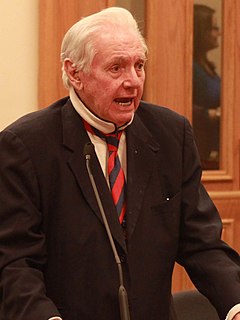A Quote by Blaise Pascal
Man is nothing but insincerity, falsehood, and hypocrisy, both in regard to himself and in regard to others. He does not wish that he should be told the truth, he shuns saying it to others; and all these moods, so inconsistent with justice and reason, have their roots in his heart.
Related Quotes
Men live a moral life, either from regard to the Diving Being, or from regard to the opinion of the people in the world; and when a moral life is practised out of regard to the Divine Being, it is a spiritual life. Both appear alike in their outward form; but in their inward, they are completely different. The one saves a man, but the other does not; for he that leads a moral life out of regard to the Divine Being is led by him, but he who does so from regard to the opinion of people in the world is led by himself.
To me the sole hope of human salvation lies in teaching Man to regard himself as an experiment in the realization of God, to regard his hands as God's hand, his brain as God's brain, his purpose as God's purpose. He must regard God as a helpless Longing, which longed him into existence by its desperate need for an executive organ.
My conception of the audience is of a public each member of which is carrying about with him what he thinks is an anxiety, or a hope, or a preoccupation which is his alone and isolates him from mankind and in this respect at least the function of a play is to reveal him to himself so that he may touch others by virtue of the revelation of his mutuality with them. If only for this reason I regard the theater as a serious business, one that makes or should make man more human, which is to say, less alone.
The Great Man's sincerity is of the kind he cannot speak of, is not conscious of: nay, I suppose, he is conscious rather of insincerity; for what man can walk accurately by the law of truth for one day? No, the Great Man does not boast himself sincere, far from that; perhaps does not ask himself if he is so: I would say rather, his sincerity does not depend on himself; he cannot help being sincere!
Man—every man—is an end in himself, not a means to the ends of others; he must live for his own sake, neither sacrificing himself to others nor sacrificing others to himself; he must work for his rational self-interest, with the achievement of his own happiness as the highest moral purpose of his life.
One of man's important mistakes, one which must be remembered, is his illusion in regard to his I. Man such as we know him, the 'man-machine,' the man who cannot 'do,' and with whom and through whom everything 'happens,' cannot have a permanent and single I. His I changes as quickly as his thoughts, feelings and moods, and he makes a profound mistake in considering himself always one and the same person; in reality he is always a different person, not the one he was a moment ago.
There is no crime more infamous than the violation of truth. It is apparent that men can be social beings no longer than they believe each other. When speech is employed only as the vehicle of falsehood, every man must disunite himself from others, inhabit his own cave and seek prey only for himself.
A man who finds himself among others is irritated because he does not know why he is not one of the others. In bed next to a girl he loves, he forgets that he does not know why he is himself instead of the body he touches. Without knowing it, he suffers from the mental darkness that keeps him from screaming that he himself is the girl who forgets his presence while shuddering in his arms.
I believe that the unity of man as opposed to other living things derives from the fact that man is the conscious life of himself. Man is conscious of himself, of his future, which is
death, of his smallness, of his impotence; he is aware of others as others; man is in nature, subject to its laws even if he transcends it with his thought.
A woman means by Unselfishness chiefly taking trouble for others; a man means not giving trouble to others...thus, while the woman thinks of doing good offices and the man of respecting other people's rights, each sex, without any obvious unreason, can and does regard the other as radically selfish.









































